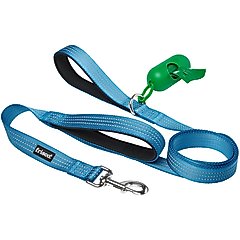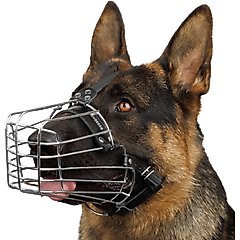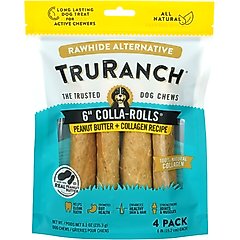Can Dogs Eat Acorns? Are Acorns Toxic to Dogs?

Photo by Chewy
Whether you’re taking a stroll through the park or your backyard, there’s a good chance your dog will come across some acorns on the ground. Inquisitive pups may even try to sneak a few bites, but can dogs eat acorns? Or are acorns poisonous to dogs?
While they might seem like harmless natural snacks, acorns are actually toxic to dogs and can cause serious health issues.
If your dog has eaten acorns, this is a medical emergency. Take them to the vet right away.
Key Takeaways
- Acorns are toxic to dogs. They contain tannins that can cause digestive upset and, in larger amounts, lead to severe liver or kidney damage.
- Even a single acorn can cause stomach upset or pose a choking hazard, especially in small dogs.
- If your dog shows signs of acorn poisoning, such as vomiting, loss of appetite, and/or lethargy, contact your veterinarian for guidance on next steps.
Can Dogs Have Acorns?
No, dogs should not eat acorns. Acorns contain natural toxins that can irritate your dog’s digestive system and lead to poisoning if eaten in excess. On top of that, their hard shells can be a choking hazard and may cause a dangerous intestinal blockage, especially in smaller dogs.
Why Are Acorns Toxic for Dogs?
Experts say eating acorns is dangerous to dogs for a few reasons. These include:
They Contain Poisonous Tannins
The main culprit behind acorn toxicity is a naturally occurring compound called tannins. Tannins are found in acorns (as well as oak leaves and bark). They can irritate your dog’s stomach lining, which can lead to vomiting, diarrhea, and/or abdominal pain, according to Sarah Cortright, DVM, veterinarian and chief medical director for the Underdog Community Project in Los Angeles.
When eaten in large enough amounts, tannins can lead to kidney or liver damage. Your dog’s body breaks down the tannins, creating a byproduct called gallic acid, which is what causes the organ damage. While not every dog will react the same way, the risk increases with repeated or significant ingestion, especially in small dogs or puppies.
They Can Develop Mold
Acorns that have been sitting on the ground for a while can develop mold, which produces toxic mycotoxins. If your dog ingests mycotoxins, it can trigger neurological symptoms like tremors, seizures, and even organ failure.
They’re a Choking Hazard
Additionally, the hard outer shell of the acorn itself can cause choking, an intestinal blockage, or damage to the digestive lining, according to Michael Hyder, DVM, medical director at VEG ER for Pets in Palo Alto, California.
How Many Acorns Are Toxic to Dogs?
The number of acorns it takes to make a dog sick varies based on their size and individual sensitivity.
In general, smaller dogs are at greater risk because it takes fewer acorns to reach a toxic dose.
| Dog Size | Potentially Toxic Amount |
|---|---|
| Extra-small dogs (2–10 pounds) | 1–2 acorns |
| Small dogs (11–20 pounds) | 2–3 acorns |
| Medium dogs (21–50 pounds) | 3–4 acorns |
| Large dogs (51–90 pounds) | 4–5 acorns |
| Extra-large dogs (91+ pounds) | 5–6 acorns |
Keep in mind, however, that even a single acorn can irritate some dogs. Plus, toxicity can build up over time. Because of that, it’s best to keep your dog away from acorns completely.
What Are the Symptoms of Acorn Poisoning in Dogs?
Symptoms of acorn poisoning in dogs typically develop within a few hours, but may take several days to appear. They can also range from mild to severe, says Dr. Hyder.
If you suspect your dog has eaten acorns, watch for the following symptoms:
- Vomiting
- Diarrhea
- Lack of appetite
- Lethargy
- Abdominal pain
- Increased thirst
- Increased urination
- Tremors or seizures (in severe cases)
My Dog Ate an Acorn—What Do I Do?
If your pup eats an acorn (whether or not they show symptoms), call your veterinarian immediately. Dr. Hyder says early treatment can help prevent more serious complications, so it’s always better to be safe than sorry.
If your dog requires treatment, the approach will depend on how recently the acorns were ingested and your dog’s symptoms. While there’s not a specific treatment for acorn toxicity, Dr. Hyder says your veterinarian may:
- Induce vomiting if the ingestion was recent and your dog is stable.
- Administer activated charcoal to reduce toxin absorption.
- Administer IV fluids to help flush the kidneys and keep your dog hydrated.
- Treat GI symptoms with anti-nausea medications.
- Monitor blood work if liver or kidney damage is suspected.
How Can I Prevent My Dog From Eating Acorns?
If your dog has a habit of munching on acorns, there are a few things you can try to protect them from harm and correct the behavior, such as:
- Supervise outdoor time: Keep a close eye on your dog while they’re outside, especially in areas with a lot of oak trees. Keep your pup on a dog leash so you can redirect them away from acorns if needed.
Recommended Product
- Clean up acorns regularly: The cleaner your dog’s environment, the better. If you have a lot of acorns in your yard, pick them up.
- Train and redirect their behavior: Teach your dog a “leave it” or “drop it” command using high-value treats, like the Hill’s Natural Jerky Mini-Strips. If you need help, consider hiring a professional trainer.
Recommended Product
- Consider a muzzle: Use a basket muzzle, like the Bronzedog Adjustable Muzzle, during walks for dogs who love to snack on the ground. However, Dr. Cortright cautions that basket muzzles should be used only with supervision.
Recommended Product
- Provide other enrichment: If your dog is eating acorns out of boredom or curiosity, redirect their attention with a safe dog chew, like the TruRanch Colla-Rolls, which can help satisfy their natural urge to chew.
Recommended Product
FAQs About Acorns and Dogs
Are acorns safe for dogs to eat?
No, acorns are not safe for dogs to eat. They contain tannins, which can upset your dog’s stomach or lead to kidney or liver damage in severe cases.
Why do dogs eat acorns?
Dogs may eat acorns for many reasons. Sometimes it’s out of curiosity when they’re exploring new scents and textures. Other times, dogs may chew on acorns to satisfy their natural urge to chew or out of boredom or habit.
What happens if a dog eats a single acorn?
If a dog eats a single acorn, they might get mild stomach upset, like vomiting or diarrhea, especially if they’re small or have a sensitive stomach. While one acorn may not cause toxicity, there’s also a risk of choking or an intestinal blockage.







